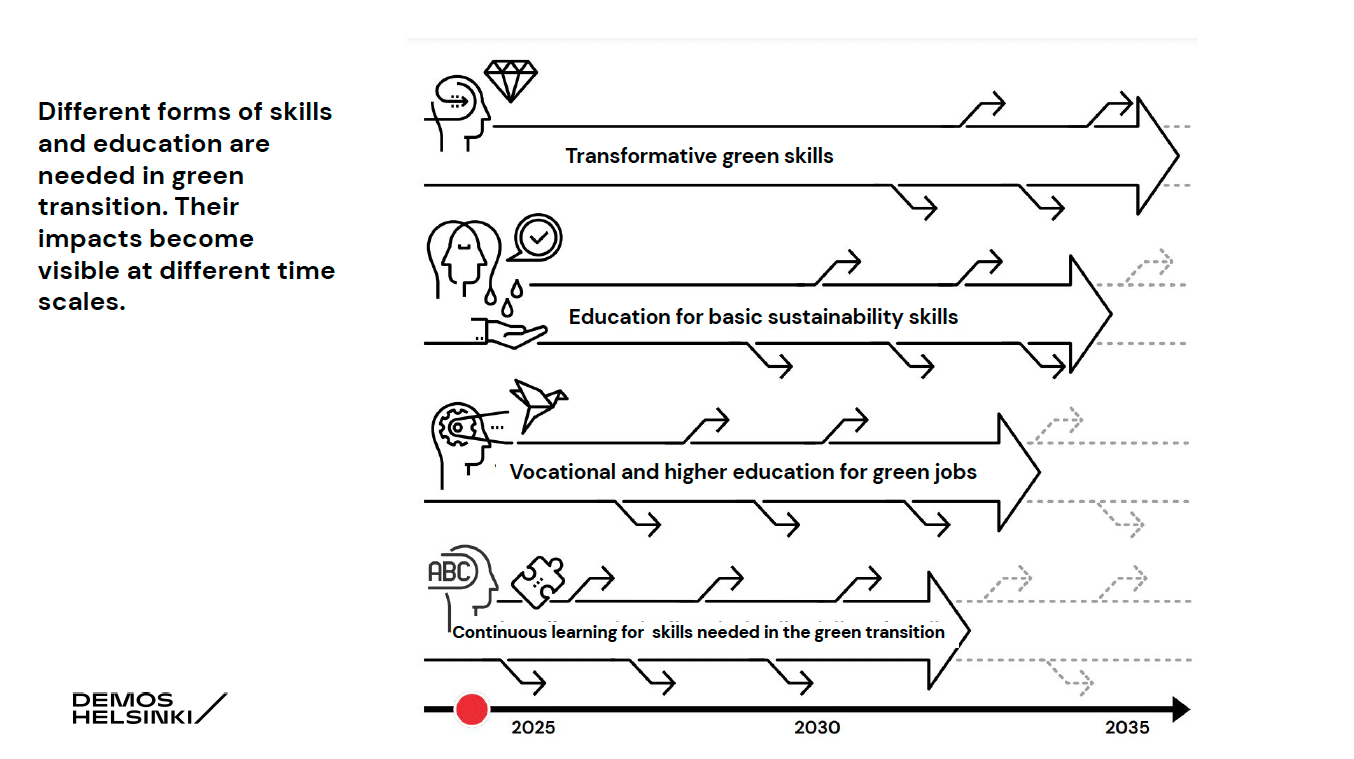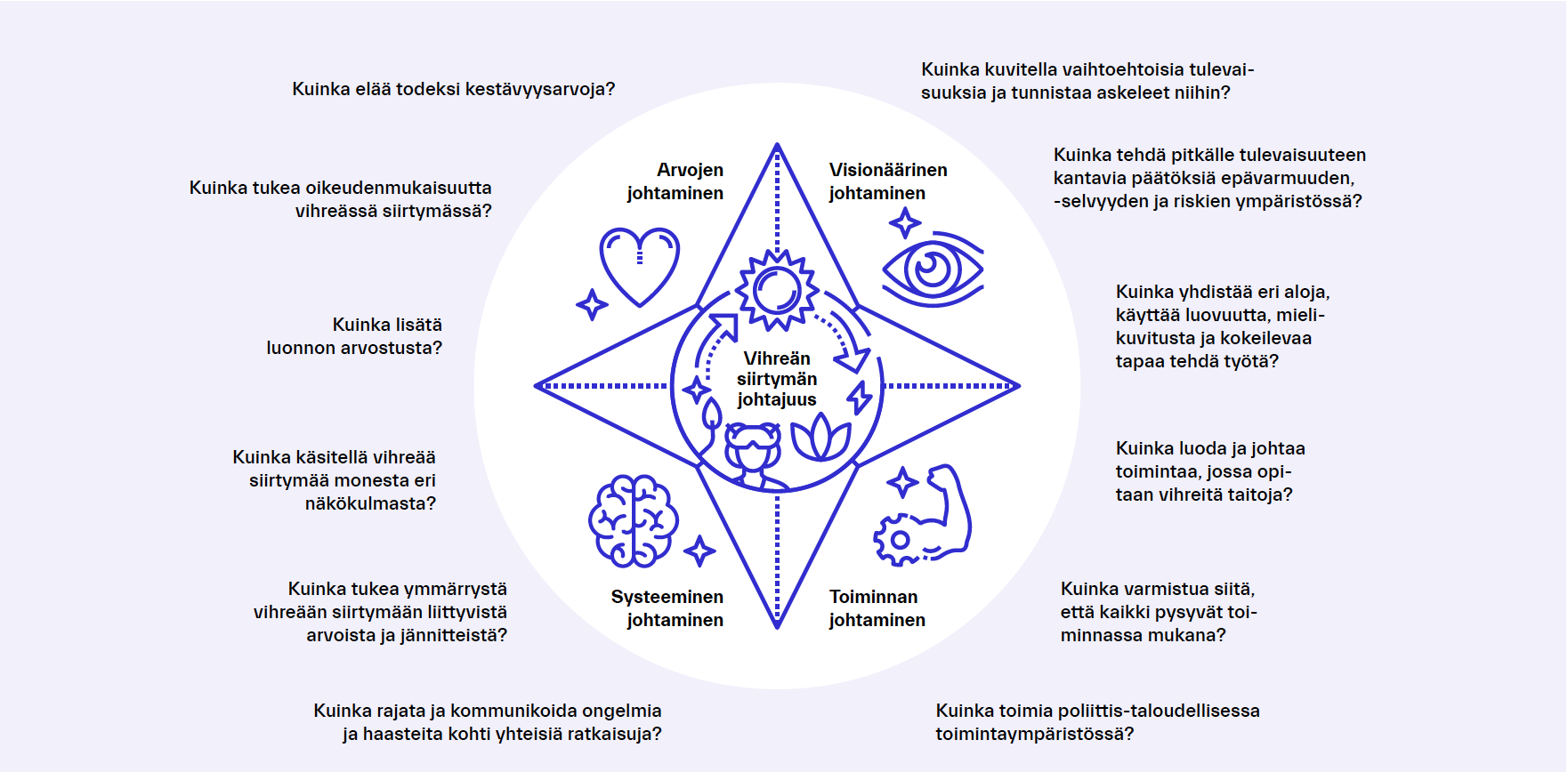There is currently a skills gap regarding the green transition. Education, training, and sustainability cannot be explored in isolation to build a sustainable future. This report, led by Demos Helsinki for the AMI Foundation, aims to get decision-makers to think about the concept of transformative green skills from a systemic perspective.
There is currently a skills gap regarding the green transition. To address it, basic sustainability-related competencies must be introduced across all levels of education and training. These competencies must be accompanied by transformative and generative skills, supporting societies through the transition.
READ THE PUBLICATION
(currently only available in Finnish)
Background and objectives
At least, this is the main conclusion of this report, which Demos Helsinki led for the AMI Foundation (a Finnish foundation focusing on the future of work). We devised three aims for the project to get decision-makers to think about the concept of transformative green skills:
– To provide universities of applied sciences and vocational colleges with the latest information on the knowledge and training needs for the green transition and to support the interpretation and exploitation of this information.
– To produce with the participants an analysis of their current capacities to respond to the skills needs of the green transition, in particular the “transformative green skills” needed in the long term in the transition.
– To develop guidelines for practical actions to meet the skills needs of the green transition.
Demos Helsinki hosted two workshops with the staff of the Helsinki metropolitan area universities of applied sciences or vocational colleges, including their teaching and administrative personnel.
Key findings
– In Finland, while there are “reskilling” and “upskilling” efforts under way, the emphasis remains on anticipating new technologies and training professionals based on these expectations.
– Green skills require leadership. From the discussions throughout this report, it was made clear that the skills should be rigorously led and not expected to be prioritised on their own. We formatted a compass to assist in seeing the different routes to leading the building of transformational green skills (currently only in Finnish).
– Individuals inadvertently lead their own skills when they develop them. In this sense, everyone is an agent in the green transition.
– Society cannot focus solely on the various, ever-changing technical skills. For example, while widely used heuristics, like the EU GreenComp are desirable and promising, they tend to overfocus on hard skills but assume that a transitional society requires the same soft skills. A society in transition requires transformational green skills. We discussed previously in “Skills an education in the sustainability transition“. Transformational green skills spread from values to actions–one approach from this project is presented in the indicator list below.

Set of 11 indicators
Based on our findings, we produced an 11-indicator list of what skills to look for and what to train. These skills may resemble “soft” skills more closely, but they are increasingly relevant to a world that faces a large transition. Think of them as companions to more traditional soft skills like good problem-solving, time management or creativity.
Here are three examples of the indicators and their descriptions based on the workshop discussions:
Systems thinking
In education, the focus is on holistic learning, with a focus on interdependencies and understanding structures. At the heart of this is the ability to perceive one’s own role in the wider ecosystem: for example, cross-subject challenge projects or discussing together the interdependencies of decisions are ways to better understand the system. Systems thinking also involves an understanding of and commitment to sustainability values.
Courage
Courage is part of change. Courage is not fearlessness, it is being able to identify the causes of fear and work through them, both for yourself and with the support of others. It is about empowering students to take action, ethical reflection and the ability to act for a more sustainable society. Learners are encouraged to take a wide range of courses or to make bold choices in their studies. It is important to give students the space to take a stand and encourage them to stand up for what matters to them.
Resilience and flexibility
Resilience is the ability to persevere and cope with change. Students learn to draw on their own resources and strengths in situations that do not go as expected. Learning resilience skills is enhanced by identifying and articulating these skills and by working together through expectations and disappointments and how to move on from them.
A compass
The green skills leadership compass has been developed from the original EU GreenComp framework. The idea is to give direction and a wider picture of what are the different areas of leadership required simultaneously to lead the development of transformational green skills. The directions are supported by questions one should ask themselves: how could I lead others and myself holistically and effectively towards supporting the growth of talented young professionals?

Why do skills matter?
This work comes as part of Demos Helsinki’s 15-year portfolio on the future of work. More recently, we have made a conscious effort to focus on what we dub “green skills”. For us, green skills are not only technical “sustainability” but also touch all workers and citizens. We believe that “green skills” encompass all the skills and competencies that are required for a society to go through a transition and sustain it. Education, training, and sustainability cannot be explored in isolation to build a sustainable future. Instead, all areas of society should complement each other to promote, achieve and sustain systemic change. Defining the right skills is one way of doing so.
Let us know what you think about this publication, or get in touch to talk about this topic with one of our experts:
Jenni Kilpi
Expert
jenni.kilpi@demoshelsinki.fi


White paper: Green skills for green futures
Publication
December 4, 2023
Skills and education in the sustainability transition
Publication
April 28, 2023
Demos Helsinki at COP28: Developing skills for the workforce of the future
Post
December 1, 2023
100 Million New Jobs: New Promise of Freedom for a Successful EU
Publication
March 7, 2019
Navigating the green transition – a toolkit for developing key skills in organisations
Publication
November 25, 2024
Capacity building
Theme
December 5, 2024